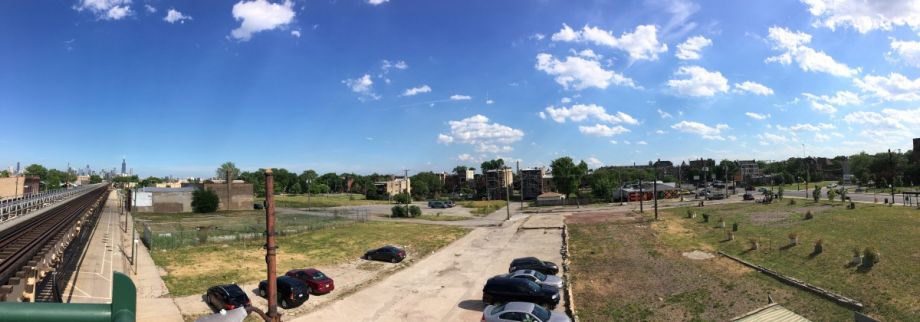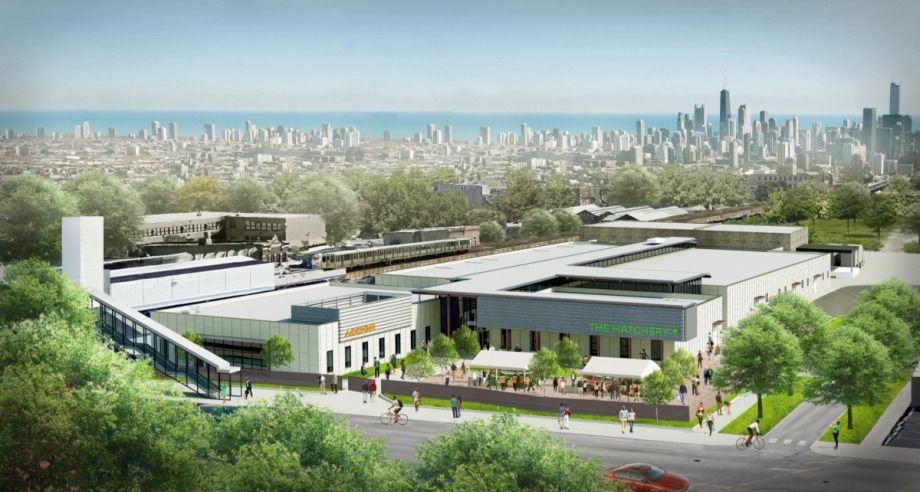Angela Taylor has been helping her neighbors grow food for years on the west side of Chicago. Soon, she’ll be helping some of them grow food businesses.
Taylor learned how to grow stuff at a young age. “Me being the youngest girl, I didn’t get to do the laundry and other chores inside,” she remembers. “I had to go outside and help daddy with the gardening.”
She and her husband moved into their current home, in the East Garfield Park neighborhood, in 2004. There was an abandoned community garden next door, covering two city lots, with raised beds.
“Right in front of where the garden had been [was] a notorious zone for the drug traffic,” Taylor recalls. “They sat in front of the garden on milk crates selling drugs all day and all night.”
She and her sisters cleaned up the space and put it back into use. It’s become the hub of the Garfield Park Community Council’s Community Garden Network, with 32 resident-led gardens scattered throughout East and West Garfield Park. Each garden provides some fresh fruits and vegetables for the gardeners, their families and neighbors, and the rest gets sold at the council’s bimonthly Neighborhood Market, which accepts food stamps as payment. “I’m sure you know we’re living in a food desert, and there is a lack of fresh produce,” says Taylor, who retired in 2012 from the Illinois Department of Human Services.
Taylor’s garden now has a rainwater catchment and irrigation system, and a community greenhouse with solar-powered heating and lighting. Every growing season, the garden network takes seedlings from the greenhouse to get started, and there’s enough left over to share with gardeners from other neighborhoods. There’s no more drug trafficking out front.
“When I first moved in, the seniors on my block wouldn’t even come out and sit on their porch because of all the drug trafficking,” Taylor adds. “But go there now and they’re sitting on their porch, some of them are taking naps, because now they feel safer in that type of environment. There’s not too much more to be said about that.”
Taylor hopes that The Hatchery, a brand-new, 67,000-square-foot food business incubator coming to the neighborhood, may have a similar effect on a much larger scale.
“It will change the synergy in that space,” she says. “The corner of Kedzie and Lake has been notorious, there’s no other way of saying it. Open-air drug trafficking, open-air drug use, prostitution, public drunkenness, you name it.”
The Hatchery is a joint venture of two other Chicago nonprofits, the Industrial Council of Nearwest Chicago (ICNC) and Accion Chicago. Upon completion in 2018, the facility will contain 56 private kitchens, one shared kitchen, dry-cold storage, loading docks, and meeting and office spaces. Accion Chicago, a community development financial institution (CDFI) and the region’s largest nonprofit microlender, will also relocate its headquarters to The Hatchery. The design calls for a tree-lined public plaza out front that will be a permanent home for the Garfield Park Community Council’s Neighborhood Market.
The city originally proposed the location to the project partners after looking around at some options and realizing that, for what they needed to do, it would be cheaper to build new than to repurpose an older industrial space. The city owns the vacant land at the site, which includes an unused garage that will be turned into part of the loading dock for the new facility. ICNC and Accion Chicago first approached Taylor and the Garfield Park Community Council about the project in fall 2015.
“It took us a minute, at least for me, to absorb it,” says Taylor, who also manages the Neighborhood Market. “The site they had picked, we had been there for three years with our Neighborhood Market. Then I gave consideration to what it was, something around food in a food desert, that was a plus. The market being incorporated in it was like the cherry on top of the ice cream on the pie.”
The $31.5 million in estimated project development costs will come from philanthropy, New Markets Tax Credits and tax increment financing. IFF, another Chicago-based CDFI that specializes in real estate development for nonprofits, has played a supporting role while the project has been in pre-development. IFF helped recruit the architects at Wight & Company, provided capital to get the ball rolling, and is working with the city to transfer ownership of the land to ICNC and Accion Chicago. As a condition from the city, there will be local hiring and Chicago-resident contracting requirements during construction.

The Hatchery project site, from the adjacent Green Line platform (Photo by Oscar Perry Abello)
ICNC started in 1967, doing advocacy work for Chicago businesses. In 1980, they acquired a 410,000-square-foot former plumbing facility, and subdivided it into 110 tenant spaces as their existing incubator space, about 2 miles east of the location for The Hatchery. Businesses rent incubator spaces for between three and five years, on average, says Steve DeBretto, executive director of ICNC.
“About three years ago, we noticed food business became the largest cohort in the building,” DeBretto says.
There might have been even more food businesses, if not for the prohibitive cost of buildout. A 1,000-square-foot space could cost around $80,000 to build out, DeBretto estimates. ICNC’s 13 current vacancies range from 925 to 13,000 square feet, with an average size of 3,290 square feet. DeBretto says food businesses might be able to afford the rent for a space, but not while also paying back a loan to build it out. “That was a big barrier to entry for people,” he says.
Meanwhile, Accion Chicago was hearing from food entrepreneurs, who made up 18 percent of their clients in 2016, that they were facing three key challenges, starting with the affordable space barrier.
“It’s the classic case where they were either in their own home kitchen but doing well enough to move out of that but not enough to find a full space they could afford to rent or build out,” says Brad McConnell, CEO of Accion Chicago.
Second, entrepreneurs had a hard time finding qualified workers willing to stick with a growing business. “The same folks were saying they also need access to workers that could grow with us over time,” McConnell adds.
Third, there was a need for access to capital from a trusted lender. “The entrepreneurs who we work with, many have tried to get a loan from a bank and been turned down, or got an online loan but not the wraparound services to ensure success,” McConnell says. “Entrepreneurs need to get a loan and somebody to believe in them.”
ICNC and Accion Chicago conceived The Hatchery as a way to address all the above. It starts with the shared kitchen — for those who may not be ready to rent a private kitchen space of their own. The private kitchens start smaller: Out of the 56 planned private kitchens, 26 are just 250 square feet, and the rest are 500 square feet. The private kitchen units will also be modular and combinable, providing flexibility to accommodate a bit of growth.
“I think the most exciting thing about it is an entrepreneur will be able to move in in a matter of days, and very easily leave when they outgrow us,” DeBretto says. “We’ll be just as happy to see people go as when they come to us.”
On the qualified workers front, workshops and classes have already started for food certification and other aspects of running a food business, offered for free or at a deep discount to residents of East Garfield Park. The Hatchery negotiated a community benefits agreement to guarantee access to those classes and other support for residents, including discounts for memberships and shared kitchen rental.
“We did not wait for the physical structure,” says Taylor. “We decided we want to be like Girl Scouts. We want to be prepared so when the development does come we’ll have residents equipped and ready.”
One benefit to Hatchery members will also be important for potential workers: access to ICNC’s subsidized on-the-job training program, which reimburses up to 50 percent of a new hire’s wages for their first six months. It’s part of ICNC’s standard member benefits package, which will be extended to all Hatchery members. The project partners estimate The Hatchery will create 150 jobs in its first year, and 900 total jobs over five years.
Accion Chicago’s storefront headquarters will be somewhat unusual for a CDFI that’s neither a bank or a credit union. Like many CDFIs, they’ve been located upstairs in an office building. They’re looking forward to moving into The Hatchery, where they will be much more visible.
“We believe there are entrepreneurs who haven’t found us yet,” says McConnell. “[The Hatchery] is right at a Green Line station, so it’s very accessible for any entrepreneur or worker throughout the city looking to participate in building a business or to come see us.”
The Garfield Park Community Council has also signed on as the project’s community partner, helping recruit workshop participants from the neighborhood and, soon, workers or tenants as well. “I think they’re going to be a great referral source for us,” DeBretto says.
The project anticipates breaking ground in the fall.

Oscar is Next City's senior economic justice correspondent. He previously served as Next City’s editor from 2018-2019, and was a Next City Equitable Cities Fellow from 2015-2016. Since 2011, Oscar has covered community development finance, community banking, impact investing, economic development, housing and more for media outlets such as Shelterforce, B Magazine, Impact Alpha and Fast Company.
Follow Oscar .(JavaScript must be enabled to view this email address)
















